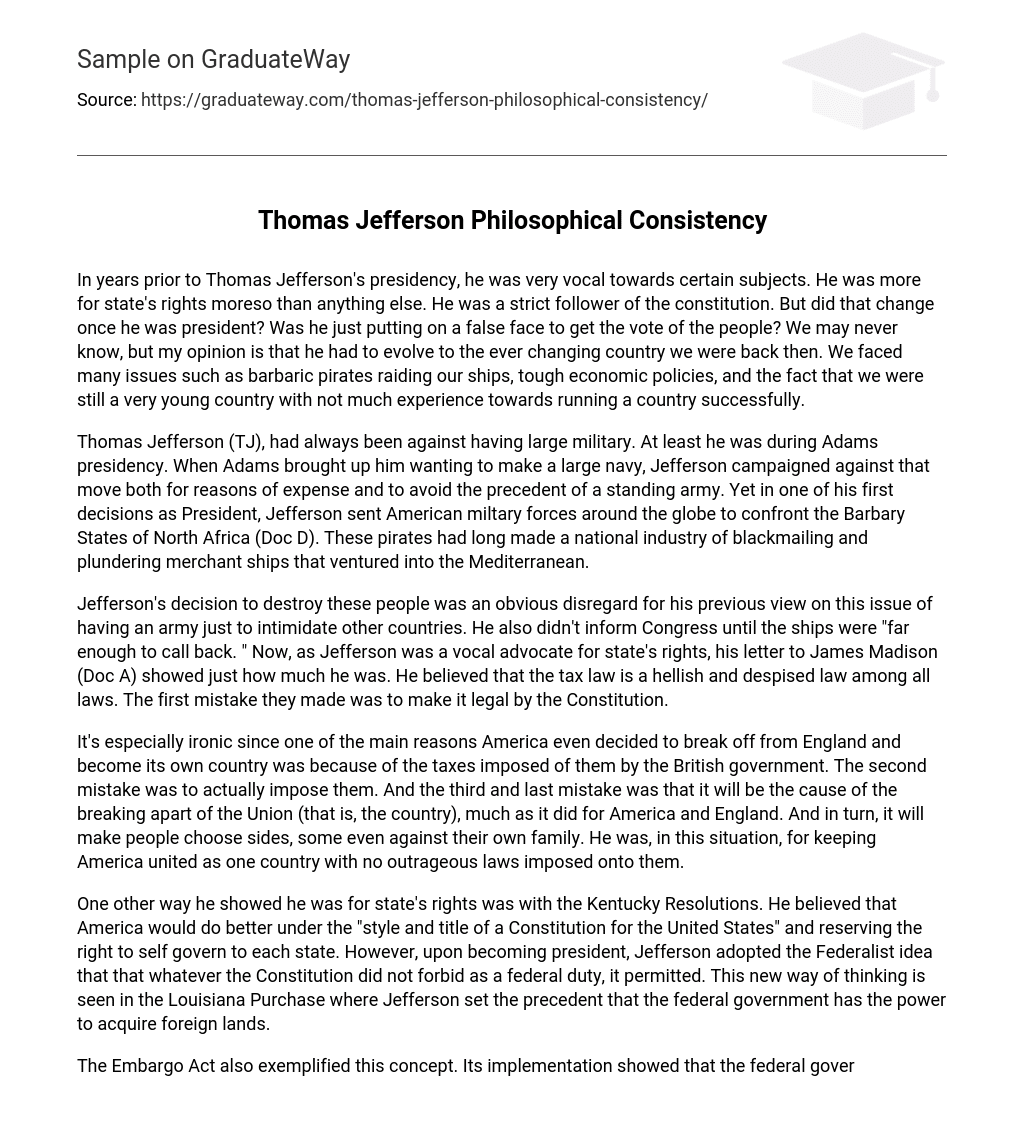In years prior to Thomas Jefferson’s presidency, he was very vocal towards certain subjects. He was more for state’s rights moreso than anything else. He was a strict follower of the constitution. But did that change once he was president? Was he just putting on a false face to get the vote of the people? We may never know, but my opinion is that he had to evolve to the ever changing country we were back then. We faced many issues such as barbaric pirates raiding our ships, tough economic policies, and the fact that we were still a very young country with not much experience towards running a country successfully.
Thomas Jefferson (TJ), had always been against having large military. At least he was during Adams presidency. When Adams brought up him wanting to make a large navy, Jefferson campaigned against that move both for reasons of expense and to avoid the precedent of a standing army. Yet in one of his first decisions as President, Jefferson sent American miltary forces around the globe to confront the Barbary States of North Africa (Doc D). These pirates had long made a national industry of blackmailing and plundering merchant ships that ventured into the Mediterranean.
Jefferson’s decision to destroy these people was an obvious disregard for his previous view on this issue of having an army just to intimidate other countries. He also didn’t inform Congress until the ships were “far enough to call back. ” Now, as Jefferson was a vocal advocate for state’s rights, his letter to James Madison (Doc A) showed just how much he was. He believed that the tax law is a hellish and despised law among all laws. The first mistake they made was to make it legal by the Constitution.
It’s especially ironic since one of the main reasons America even decided to break off from England and become its own country was because of the taxes imposed of them by the British government. The second mistake was to actually impose them. And the third and last mistake was that it will be the cause of the breaking apart of the Union (that is, the country), much as it did for America and England. And in turn, it will make people choose sides, some even against their own family. He was, in this situation, for keeping America united as one country with no outrageous laws imposed onto them.
One other way he showed he was for state’s rights was with the Kentucky Resolutions. He believed that America would do better under the “style and title of a Constitution for the United States” and reserving the right to self govern to each state. However, upon becoming president, Jefferson adopted the Federalist idea that that whatever the Constitution did not forbid as a federal duty, it permitted. This new way of thinking is seen in the Louisiana Purchase where Jefferson set the precedent that the federal government has the power to acquire foreign lands.
The Embargo Act also exemplified this concept. Its implementation showed that the federal government had the power to control foreign trade at a national level. Most importantly, Thomas Jefferson deeply contradicted his views on land expansion and violated his policy on following the constitution word for word. A prime example of this was the Louisiana Purchase, in which Napoleon offered Jefferson the opportunity to purchase all of Frances territory they held in America for only $15 million.
The French needed the money to fight a war with the British, and Jefferson wanted the Mississippi River for easier trade and more resources available to them. Jefferson read closely into the Constitution to see if there was a loophole to make such a move. Not finding any, he took the offer anyway, in a very unconstitutional way (Doc C). This blatantly disregarded and violated his previous scrutiny of the Constitution. However, it is obvious that Jefferson made the right decision in the matter, and the American people should be very grateful for Jeffersons violation of the Constitution.
The final Document really showed him contradicting himself. He was for the people before his presidency but he gradually changed his beliefs because he saw that making the people happy wasn’t going to get the country anywhere. The people realized this, and they referred to TJ as a “despot” (A ruler or other person who holds absolute power, typically exercising it cruelly. ) That shows how much people thought of him towards the end of his presidency.
TJ was a very influential man, and he had his moments where he saved America in certain aspects, but I believe he blatantly disregarded his past hilosophies during his presidency, although there might be a reasoning behind that. That might’ve been the only way to get our country where it is now. The three largest contradictions that stand out amongst his actions were his war with the Barbary pirates, using restrictive economic policies to achieve his goals, and his acquiring of Louisiana. Although these contradictions were for the good of the country, he still went against the convictions that got him elected.





